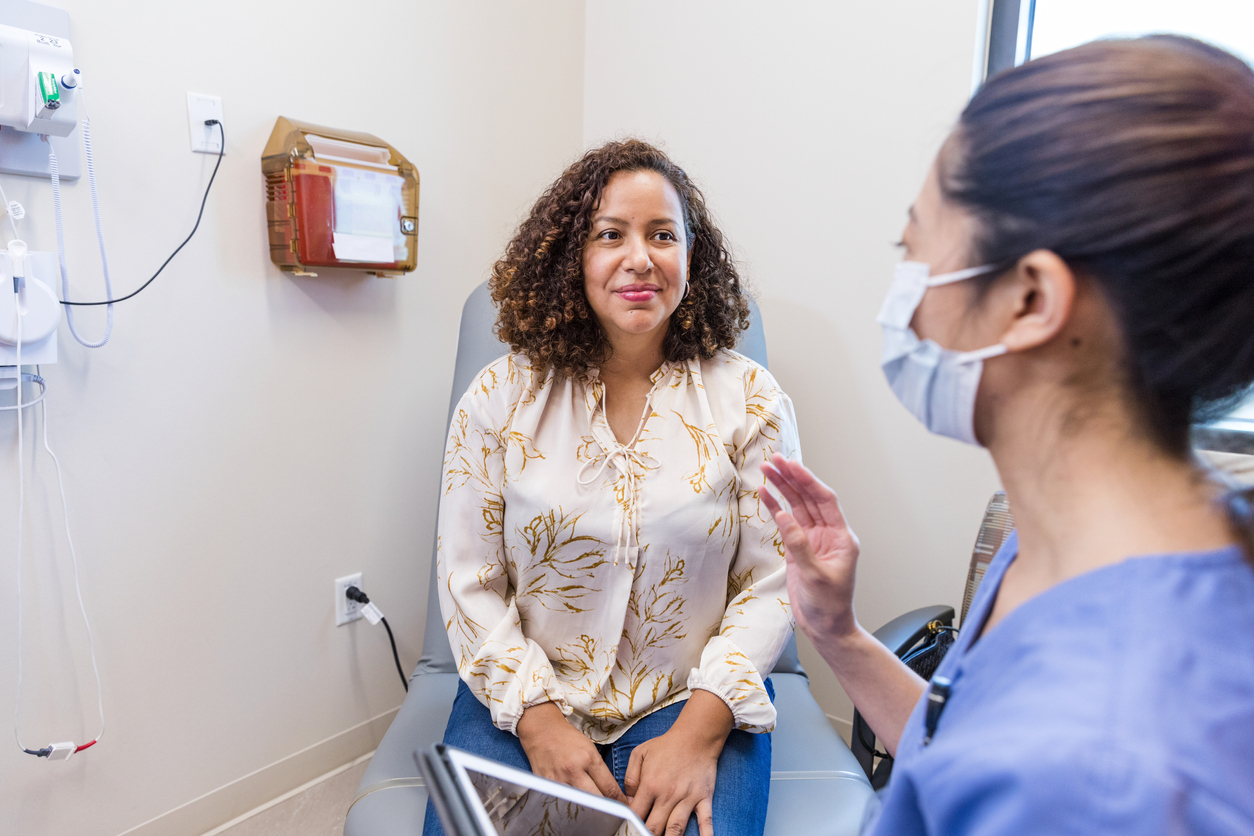What to expect from a pain management doctor visit
Pain management doctors study pain, its root cause, and a wide variety of different treatment options for it. Since the field of pain management is advancing so quickly, it is difficult to know what to expect when you visit a specialist for the first time. You might be wondering how working with a pain management doctor will differ from your experience with other physicians, what you need to do to prepare for the appointment, what questions you should ask, and more. We’re here to answer that for you so that you can go into your appointments with a general understanding of the process and peace of mind.
How to prepare for your first appointment

Before you go to your pain management doctor’s office or clinic, be sure to gather notes, test results, scans,relevant imaging (XR, MRI etc.), treatments and any other medical information that could be relevant to your pain. Your new pain management doctor will perform examinations and may order additional tests of their own, but they will also want to look over your previous medical history. Since pain management doctors are specialists in dealing with chronic pain, they are likely to notice details and have insights that can help assist with your treatment.
If you know about your appointment in advance or even if you are just considering visiting a pain management doctor, you should also bring a detailed log of your pain. In this pain journal, record things such as the intensity, location, and sensation of your pain. If you notice that it gets better or worse during certain times of the day or while you are doing a particular task, write that down as well.
It can also be helpful to bring a family member or close friend with you to your first appointment. Having someone by your side who can advocate for you and ask questions you did not think of will be very reassuring, especially if you are nervous.
Finally, have a list of questions prepared for your pain management doctor. It is a good idea to write your questions down to make sure that nothing gets left out or glossed over. The questions you ask will vary based on your particular circumstance, but taking time to think of everything you want to know from your pain management doctor will help you better understand the next steps in your treatment.
At your first appointment with Capitol Pain Institute
Once you have everything you need for your first visit (including your ID and insurance card), you will be fully prepared, but you may still be wondering what to expect. Once you have your records and your insurance and ID cards, you’ll be ready for your first visit.
At Capitol Pain Institute, your pain management doctor will start by asking you detailed questions about your pain symptoms, medical history and any previous treatments. They’ll also review any documentation that you brought along. Be ready to share everything from how long you have been dealing with chronic pain to what your daily routine consists of. This will also be a good time to show your doctor your pain journal and go over your list of questions.
After reviewing your documentation and asking questions about your pain, the doctor will perform a thorough physical examination and discuss your pain management goals with you. Additional imaging, lab work or tests (such as Electromyography/Nerve Conduction Study (EMG/NCS)) may be ordered to help understand the root cause of your pain.
At the end of your visit, your pain management doctor will carefully review your assessment and deliver a precise diagnosis so you can collaboratively develop the best plan to alleviate your pain. Whether you tend to be more conservative in your medical decision making or you prefer a more aggressive approach, we want to work with you to develop a treatment plan that fits your lifestyle.

How does a pain management doctor treat pain?
As specialists in the field, pain management doctors study methods to treat pain from a variety of different approaches. Treatment plans can include physical therapy, surgical procedures, diet changes, and increasing or reducing exercise. Typically, pain management doctors recommend a combination of a few of these techniques. Their goal is to help their patients cope with pain in a way that does not inhibit their quality of life.
You can learn more about how pain management doctors treat pain in our article on what pain management doctors do.
What to expect at your appointments after you become an established patient
At regularly scheduled monthly visits, you and your pain management doctor will discuss your pain exacerbators and review any new tests or studies that have been ordered.This helps reveal changes in your condition and will be very useful in tracking your progress and how effectively your treatment plan is performing.
When to contact your pain management doctor in an emergency
At regularly scheduled monthly visits, you and your pain management doctor will discuss your pain exacerbators and review any new tests or studies that have been ordered.This helps reveal changes in your condition and will be very useful in tracking your progress and how effectively your treatment plan is performing.
When to contact your pain management doctor in an emergency Sometimes pain management treatment involves a lot of trial and error and this is extremely frustrating for chronic pain patients. When your symptoms worsen, your medications are not working, and your primary care physician is at a loss, it can be reassuring to know that your doctor makes pain management their priority.
Contact your pain management doctor if your pain suddenly worsens exponentially. In some situations, they may advise you to go to the emergency room. Once your pain is under control, your primary care doctor will look deeper into the cause of it. Since your pain management doctor understands how chronic pain is intertwined with all aspects of your life, they will have a more productive treatment plan than the emergency room doctors.
Contact CPI if your pain suddenly worsens exponentially. We will make small adjustments to your treatment, have you come in for evaluation or send you to the ER based on your situation.
If your pain is tolerable, yet still worse than usual, your pain management doctor will likely want to see you in the office or clinic as soon as possible. Then they will access any changes in your routine and check on how you are reacting to any medications that you are on. If no explanation presents itself, your doctor will then run tests to find out why your pain is intensified.
How to find a pain management doctor
When chronic pain is keeping you from living your daily life, your first step will be to talk to your primary care physician so that you can be referred to a pain management doctor. Your physician will refer you to a specific clinic that can help meet your needs.
Once you find a pain management specialist who can diagnose your pain and begin treatment, they might refer you to one of their colleagues who has a more focused specialty.
What to do if your pain management doctor changes
Whether you are referred to a different specialist, your pain management doctor retires, or one of you moves away, it can be stressful when you suddenly have a new doctor. However, it does not mean that you have to start from square one again to keep your pain manageable. Your previous doctor will send your medical information along with any of their notes and plans to your new pain management doctor.
This helps your new doctor gain a better understanding of your situation and continue the treatment plan. With a timeline of your experience thus far, they will also be able to tell when to try something new if any methods of treatment are not working.
